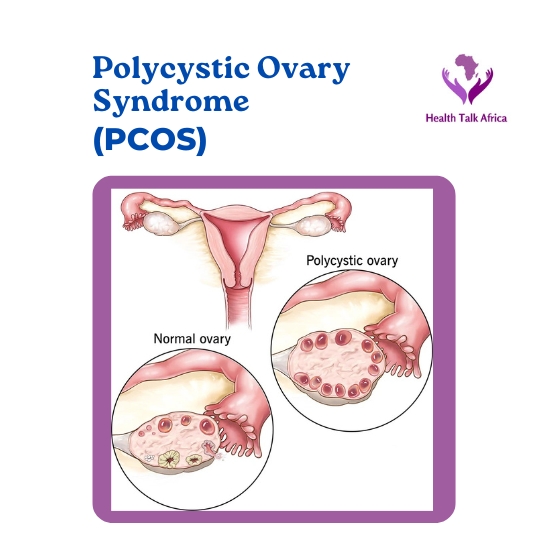Overview
Polycystic Ovary Syndrome (PCOS) is a common endocrine disorder that affects people with ovaries, primarily during their reproductive years. PCOS is characterized by a range of hormonal imbalances and physical symptoms, which can have significant implications for a person’s health and quality of life.
What is PCOS?
PCOS is a complex hormonal disorder that results when the ovaries (the reproductive organs responsible for producing and releasing eggs) make excess hormones.
Polycystic ovary syndrome (PCOS) is a condition in which the ovaries produce an abnormally high amount of androgens (male sex hormones). The name polycystic ovary syndrome describes the numerous small cysts (fluid-filled sacs) that form in the ovaries. However, some women with this disorder do not have cysts, while some women without the disorder do develop cysts.
PCOS is one of the most common causes of infertility in women.
Causes of PCOS:
The exact cause of PCOS remains unknown, it’s still a subject of ongoing research. While the precise factors leading to PCOS are not fully understood, several factors are believed to contribute to its development:
Hormonal Imbalance: PCOS is associated with elevated levels of androgens (male hormones), such as testosterone, in individuals with ovaries. These hormonal imbalances disrupt the normal menstrual cycle and can lead to a range of symptoms.
Insulin Resistance: Many individuals with PCOS also have insulin resistance, a condition where the body’s cells do not respond efficiently to insulin. Insulin resistance can lead to elevated insulin levels, which can further contribute to hormonal disruptions.
Genetics: There appears to be a genetic component to PCOS. Individuals with a family history of PCOS are at a higher risk of developing the condition.
Symptoms of PCOS:
PCOS presents with a wide range of symptoms, and not all individuals will experience the same ones. Common signs and symptoms include:
Irregular Menstrual Cycles: PCOS often leads to irregular or absent menstrual periods. Some individuals may experience heavy or prolonged bleeding.
Ovulation Issues: PCOS can lead to anovulation, where the ovaries do not release eggs regularly. This can contribute to fertility problems.
Polycystic ovaries: PCOS might cause your ovaries to be bigger. Many follicles containing immature eggs may develop around the edge of the ovary and the ovaries might not function as they ought to.
Acne and Oily Skin: Elevated androgen levels can lead to acne and increased oiliness of the skin.
Hair Loss: Thinning of the hair on the scalp, known as male-pattern baldness, can occur in some individuals.
Weight Gain: Many individuals with PCOS struggle with weight gain and obesity, which can exacerbate other symptoms.
Mood Changes: PCOS has been associated with mood disorders, including depression and anxiety.
Diagnosis of PCOS:
Diagnosing PCOS typically involves a comprehensive evaluation, including:
Medical History: A detailed medical history, including menstrual patterns, symptoms, and family history, is essential.
Physical Examination: A physical examination, including assessment for signs of hirsutism, acne, and skin changes, is conducted.
Blood Tests: Hormone levels, including androgens and insulin, are measured.
Pelvic Ultrasound: An ultrasound of the pelvis may be performed to examine the ovaries for cysts or other abnormalities.
Management and Treatment:
There is no cure for PCOS, but management focuses on alleviating symptoms, preventing complications, and improving overall health. Treatment strategies may include:
Lifestyle Modifications: A healthy diet and regular exercise can help manage weight, reduce insulin resistance, and improve hormonal balance.
Medications: Hormonal birth control methods, anti-androgen medications, and insulin-sensitizing drugs may be prescribed to regulate menstrual cycles, manage symptoms, and improve fertility.
Fertility Treatments: Individuals trying to conceive may require fertility treatments, such as ovulation induction or in vitro fertilization (IVF).
Regular Check-ups: Routine check-ups and monitoring of hormone levels and metabolic parameters are essential for long-term management.
Mental Health Support: Counseling or therapy may be beneficial for individuals dealing with mood disorders associated with PCOS.
Conclusion:
Polycystic Ovary Syndrome is a complex and challenging condition that affects a significant number of individuals with ovaries. While there is no cure, effective management strategies are available to help alleviate symptoms, improve fertility, and promote overall well-being. Early diagnosis, a healthy lifestyle, and ongoing medical care are essential in managing PCOS and reducing its impact on one’s life.


Nice one
Thanks
This was helpful
Early detection can prevent a whole lot
I have heard of PCOS before but it’s great to have a proper read of it. Thanks!
This article has broaden my knowledge I must say!
Thank you for this sir
A lot of young ladies need to see this article and be well informed about PCOS. Thanks so much for this information
Early detection can prevent a whole lot
Very informative